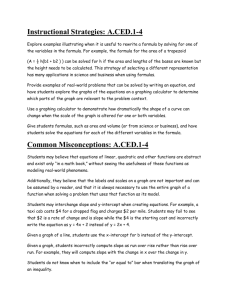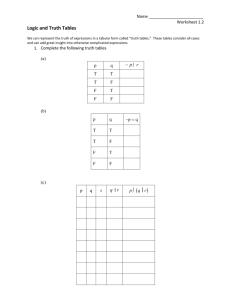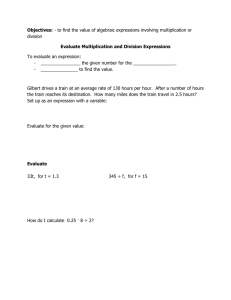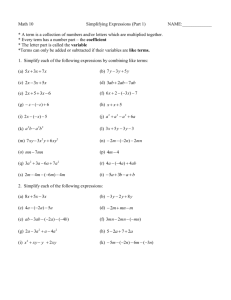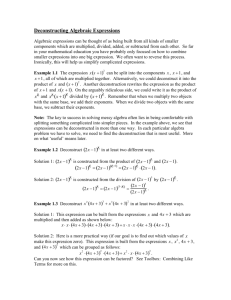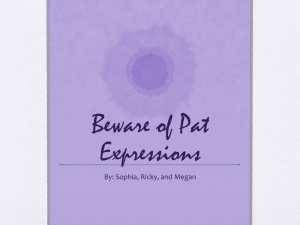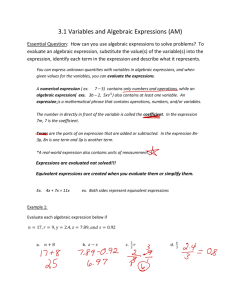7th Grade Lesson Plans for the week of: ______09-30-13 to 10
advertisement
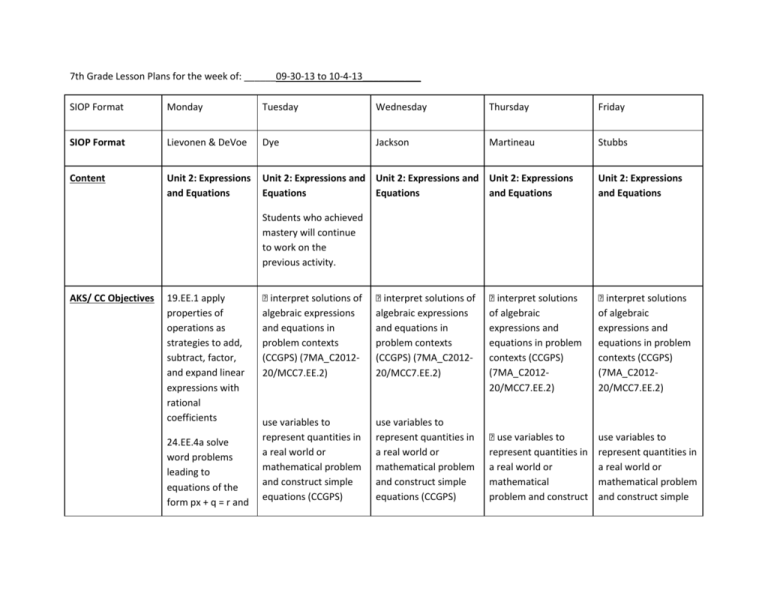
7th Grade Lesson Plans for the week of: ______09-30-13 to 10-4-13___________ SIOP Format Monday Tuesday Wednesday Thursday Friday SIOP Format Lievonen & DeVoe Dye Jackson Martineau Stubbs Content Unit 2: Expressions and Equations Unit 2: Expressions and Unit 2: Expressions and Unit 2: Expressions Equations Equations and Equations Unit 2: Expressions and Equations Students who achieved mastery will continue to work on the previous activity. AKS/ CC Objectives 19.EE.1 apply properties of operations as strategies to add, subtract, factor, and expand linear expressions with rational coefficients 24.EE.4a solve word problems leading to equations of the form px + q = r and Ÿ interpret solutions of algebraic expressions and equations in problem contexts (CCGPS) (7MA_C201220/MCC7.EE.2) Ÿ interpret solutions of algebraic expressions and equations in problem contexts (CCGPS) (7MA_C201220/MCC7.EE.2) use variables to represent quantities in a real world or mathematical problem and construct simple equations (CCGPS) use variables to represent quantities in a real world or mathematical problem and construct simple equations (CCGPS) Ÿ interpret solutions of algebraic expressions and equations in problem contexts (CCGPS) (7MA_C201220/MCC7.EE.2) Ÿ interpret solutions of algebraic expressions and equations in problem contexts (CCGPS) (7MA_C201220/MCC7.EE.2) Ÿ use variables to represent quantities in a real world or mathematical problem and construct use variables to represent quantities in a real world or mathematical problem and construct simple Essential Questions p(x + q) = r, where p, q, and r are specific rational numbers and solve equations of these forms fluently. Compare an algebraic solution to an arithmetic solution identifying the sequence of the operations used in each approach (e.g., the perimeter of a rectangle is 54 cm. Its length is 6 cm. What is its width?) (7MA_C201223/MCC7.EE.4) (7MA_C201223/MCC7.EE.4) simple equations (CCGPS) (7MA_C201223/MCC7.EE.4) equations (CCGPS) (7MA_C201223/MCC7.EE.4) How can I apply adding and subtracting linear expressions to perimeter and area problems? Why do we need to know how to evaluate linear expressions? Why do we need to know how to evaluate linear expressions? What do we need to know about Algebraic Expressions, Evaluating , Combining and Equations for the quiz on Friday. How can I successfully demonstrate my mastery of the skills on algebraic expressions ? How do I correctly combine like terms with negative sign or when subtracting? Lesson Title Evaluate an Algebraic Expression and apply the knowledge in real world perimeter problems Linear Expressions Linear Expressions Review: Algebraic Expressions, Evaluating , Combining and Linear Expressions CA #3 Standards of Learning By Wednesday, SWBAT to correctly combine like terms and simplify an algebraic expression and apply their knowledge to real world perimeter problems. By Wednesday SWBAT to understand how to add linear expressions. By Thursday SWBAT to solve understand how to subtract linear expressions SWBAT show that they can combine, evaluate, add, and subtract expressions. SWBAT to demonstrate their mastery of the algebraic expressions and equations in a testing environment. Materials/Resourc es Needed -Who wants to be a Unit 2 Chapter 3 millionaire game Pg 209 (Located in the Shared Drive under Dry eraser boards Resources) Unit 2 Chapter 3 Unit 2 Chapter 3 Pg 217 Pg 163,189, 209,217 pencil, scratch sheets and tests Dry eraser boards Dry eraser boards -Dry eraser boards - Algebra Tiles - Algebra Tiles - Algebra Tiles - Algebra Tiles - Math Books, p. 193 (Distributive Property practice), p. 215 (Adding Linear Expressions), p. 221 (Subtracting Linear Expressions) - Math Books, p. 193 (Distributive Property practice), p. 215 (Adding Linear Expressions), p. 221 (Subtracting Linear Expressions) - Math Books, p. 193 (Distributive Property practice), p. 215 (Adding Linear Expressions), p. 221 (Subtracting Linear Expressions) vocab: inverse operations, isolate Quickly review the procedures for add and subtracting linear expressions Quickly review the procedures for working in stations. - Math Books, p. 193 (Distributive Property practice), p. 215 (Adding Linear Expressions), p. 221 (Subtracting Linear Expressions) Anticipatory Set Quickly review processes for combining like terms (i.e. with distributive property, and with negative signs in front of the parenthesis). With Who Wants to be Millionaire Game. ask simple puzzles that can be represented by equations (i’m thinking of a number. for more than my number is 7. what’s my number?) when students provide the answer, explain that their thought process can be written out using a one-step equation. Ask students if they have any area of concern before the test begins. At end of class SWBAT SWBAT correctly combine positive and negative terms, in addition to combining terms using the Distributive Property. SWBAT correctly apply their knowledge to real world perimeter problems. At end of class, SWBAT At end of class, SWBAT evaluate addition linear evaluate subtraction expressions linear expressions At the end of class, SWBAT show through the rotation of stations they have mastered the concepts of algebraic expressions. Teacher Input Encourage every student in the group to simplify each question and share with the team leader to display the correct solution. Remind students that evaluating expressions is like combining like terms. Teacher will monitor each station to ensure mastery. Teacher will display powerpoint as teaching tool for lesson Take up test and check sheets using the document camera. Guided Practice Teacher will assist students and teams with problems in which they are having difficulty simplifying. Students and teacher will answer questions from powerpoint together PPT Adding Linear Expressions in resources Students and teacher will answer questions in powerpoint together PPT Subtracting Linear Expressions in resources The teacher will rotate to each station making sure that the students understand the process. 1. Combining terms 2. Adding linear 3. Subtracting linear 4. Evaluating 5. Create thinking map (tree or brace) Independent Practice Each student will individually work out the problem and share their answers with their team. Homework http://math.about. com/od/algebrawo rksheets/ss/Algebr a-.htm -Have students workbook page 11 Students will complete student handout located in shared drive Students will complete problems at each station. Students will complete handout Students will study for the CA#3 test.. write down 10 problems. Or Area and Algebra from S: resources.

